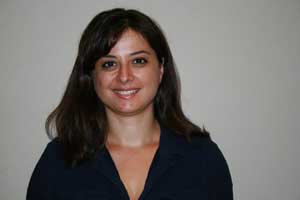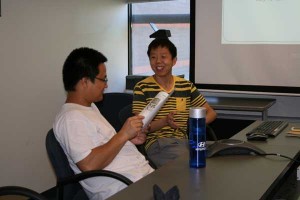
When Handan Acar came to Iowa State from Bilkent University in Turkey, she didn’t have much time to transition from student to doctor.
Just two weeks after finishing her Ph.D. in materials science, Acar came from the UNAM Institute of Materials Science and Nanotechnology to work with Reza Montazami, assistant professor of mechanical engineering, on advanced functional polymers for transient electronics, which have biomedical, military and intelligence applications, and next generation lithium-ion polymer batteries that are used in common electronic devices.
Acar says her interest in the energy sector, and batteries specifically, combined with her undergraduate degree in chemistry offer a different perspective on the project.
“Chemists know a lot about polymers, and I can think about how to improve a polymer at the molecular level from another viewpoint. Because it’s a hugely multidisciplinary project, all these ideas will come together to create the best end result. And, I’ve been learning a lot about engineering, especially related to advanced polymers in lithium-ion polymer batteries,” she said.
Outside of her research project, she also had to get acclimated to day-to-day life at Iowa State. From finding a bank to navigating her way around all the facilities available on campus (including one of her favorite spots—Caribou Coffee), she says there was a lot she just didn’t know about.
After talking with administrators in the department, she realized there was an opportunity to get others in the same predicament together. So she collected e-mail addresses for all eight researchers holding postdoctoral positions in the department and coordinated a meeting to get to know one another.
The first meeting proved a success, and the group was eager to make their gatherings more than a social event. They invited Assistant Professor Alberto Passalacqua to talk about his recent experience as a postdoctoral assistant. And Montazami presented about applying for faculty positions in the United States.

Recently, group members have been giving presentations about their own research projects to open up group discussion.
“We all have different backgrounds academically and nationally, and our experiences give us new ways to look at each other’s projects. Since we are all postdocs, we can have high-level conversations and brainstorm ideas that add value to what we are doing. It’s a pretty empowering and exciting group,” Acar said.
Acar will wrap up her postdoctoral position in February 2014, but she says academia is where she wants to stay. After struggling at one point with whether she even wanted to finish her Ph.D., she knows now that there is no better fit for her.
“I’m really curious about everything, and working in this type of environment is very satisfying for me,” she said. “I will never really be done learning, so I’ll probably always view myself as a student in that sense. But I also have confidence I’ve never had before. I can help others learn important things, and that’s a great feeling.”